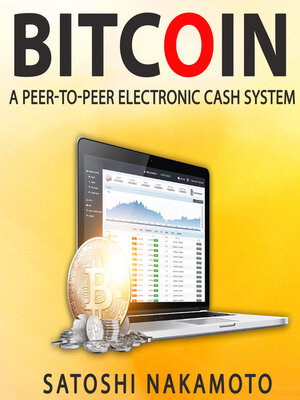
Sign up to save your library
With an OverDrive account, you can save your favorite libraries for at-a-glance information about availability. Find out more about OverDrive accounts.
Find this title in Libby, the library reading app by OverDrive.



Search for a digital library with this title
Title found at these libraries:
| Library Name | Distance |
|---|---|
| Loading... |
"Bitcoin: A Peer-to-Peer Electronic Cash System" is the seminal white paper published by the enigmatic Satoshi Nakamoto in 2008, marking a pivotal moment in the evolution of digital currency. This document introduces Bitcoin, a revolutionary decentralized digital currency that facilitates secure, direct transactions between individuals without the need for a central authority such as banks or financial institutions. The white paper meticulously outlines the architecture and functioning of the Bitcoin network, which relies on a peer-to-peer topology to operate seamlessly. At the core of Bitcoin's design is the blockchain, a public ledger that records all transactions across the network. This ledger is maintained by a network of nodes that validate and timestamp transactions through a consensus mechanism known as Proof of Work (PoW). Miners, participants who contribute computational power to solve cryptographic puzzles, play a crucial role in this process by ensuring the integrity and chronological order of the blockchain while being rewarded with newly minted bitcoins. The white paper addresses critical challenges that plagued earlier attempts at digital cash systems, particularly the problem of double-spending—where a single digital token could be spent more than once. By employing cryptographic proof and a distributed network, Bitcoin ensures that once a transaction is confirmed, it is immutable and publicly verifiable, thereby preventing any alteration or fraud. Furthermore, the paper discusses the implications of a fixed supply of bitcoins, capped at 21 million, which introduces scarcity and positions Bitcoin as a deflationary asset. This finite supply is managed through a halving process, where the reward for mining new blocks is halved approximately every four years, slowing the rate of new bitcoin creation over time. In essence, "Bitcoin: A Peer-to-Peer Electronic Cash System" not only proposes a novel technological framework but also encapsulates a vision for a financial system that is transparent, secure, and independent of traditional centralized control. This vision has since sparked the creation of numerous cryptocurrencies and blockchain-based applications, fundamentally transforming the landscape of digital finance and the broader economic system.







